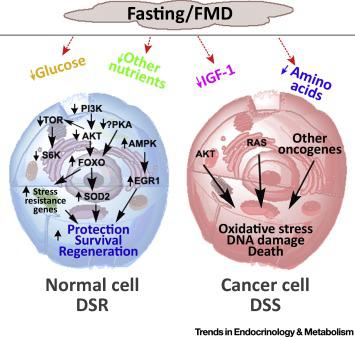当前位置:
X-MOL 学术
›
Trends Endocrin. Met.
›
论文详情
Our official English website, www.x-mol.net, welcomes your feedback! (Note: you will need to create a separate account there.)
Starvation, Stress Resistance, and Cancer
Trends in Endocrinology & Metabolism ( IF 10.9 ) Pub Date : 2018-04-01 , DOI: 10.1016/j.tem.2018.01.008 Roberta Buono 1 , Valter D Longo 2
Trends in Endocrinology & Metabolism ( IF 10.9 ) Pub Date : 2018-04-01 , DOI: 10.1016/j.tem.2018.01.008 Roberta Buono 1 , Valter D Longo 2
Affiliation

|
Cancer cells are characterized by dysregulation in signal transduction and metabolic pathways leading to increased glucose uptake, altered mitochondrial function, and the evasion of antigrowth signals. Fasting and fasting-mimicking diets (FMDs) provide a particularly promising intervention to promote differential effects in normal and malignant cells. These effects are caused in part by the reduction in IGF-1, insulin, and glucose and the increase in IGFBP1 and ketone bodies, which generate conditions that force cancer cells to rely more on metabolites and factors that are limited in the blood, thus resulting in cell death. Here we discuss the cellular and animal experiments demonstrating the differential effects of fasting on normal and cancer cells and the mechanisms responsible for these effects.
中文翻译:

饥饿、抗压和癌症
癌细胞的特征是信号转导和代谢途径失调,导致葡萄糖摄取增加、线粒体功能改变和抗生长信号的逃避。禁食和禁食模拟饮食 (FMD) 提供了一种特别有前景的干预措施,可以促进正常细胞和恶性细胞的不同作用。这些影响部分是由 IGF-1、胰岛素和葡萄糖的减少以及 IGFBP1 和酮体的增加引起的,这些条件产生的条件迫使癌细胞更多地依赖血液中受限的代谢物和因子,从而导致在细胞死亡中。在这里,我们讨论了证明禁食对正常细胞和癌细胞的不同影响的细胞和动物实验,以及导致这些影响的机制。
更新日期:2018-04-01
中文翻译:

饥饿、抗压和癌症
癌细胞的特征是信号转导和代谢途径失调,导致葡萄糖摄取增加、线粒体功能改变和抗生长信号的逃避。禁食和禁食模拟饮食 (FMD) 提供了一种特别有前景的干预措施,可以促进正常细胞和恶性细胞的不同作用。这些影响部分是由 IGF-1、胰岛素和葡萄糖的减少以及 IGFBP1 和酮体的增加引起的,这些条件产生的条件迫使癌细胞更多地依赖血液中受限的代谢物和因子,从而导致在细胞死亡中。在这里,我们讨论了证明禁食对正常细胞和癌细胞的不同影响的细胞和动物实验,以及导致这些影响的机制。



























 京公网安备 11010802027423号
京公网安备 11010802027423号